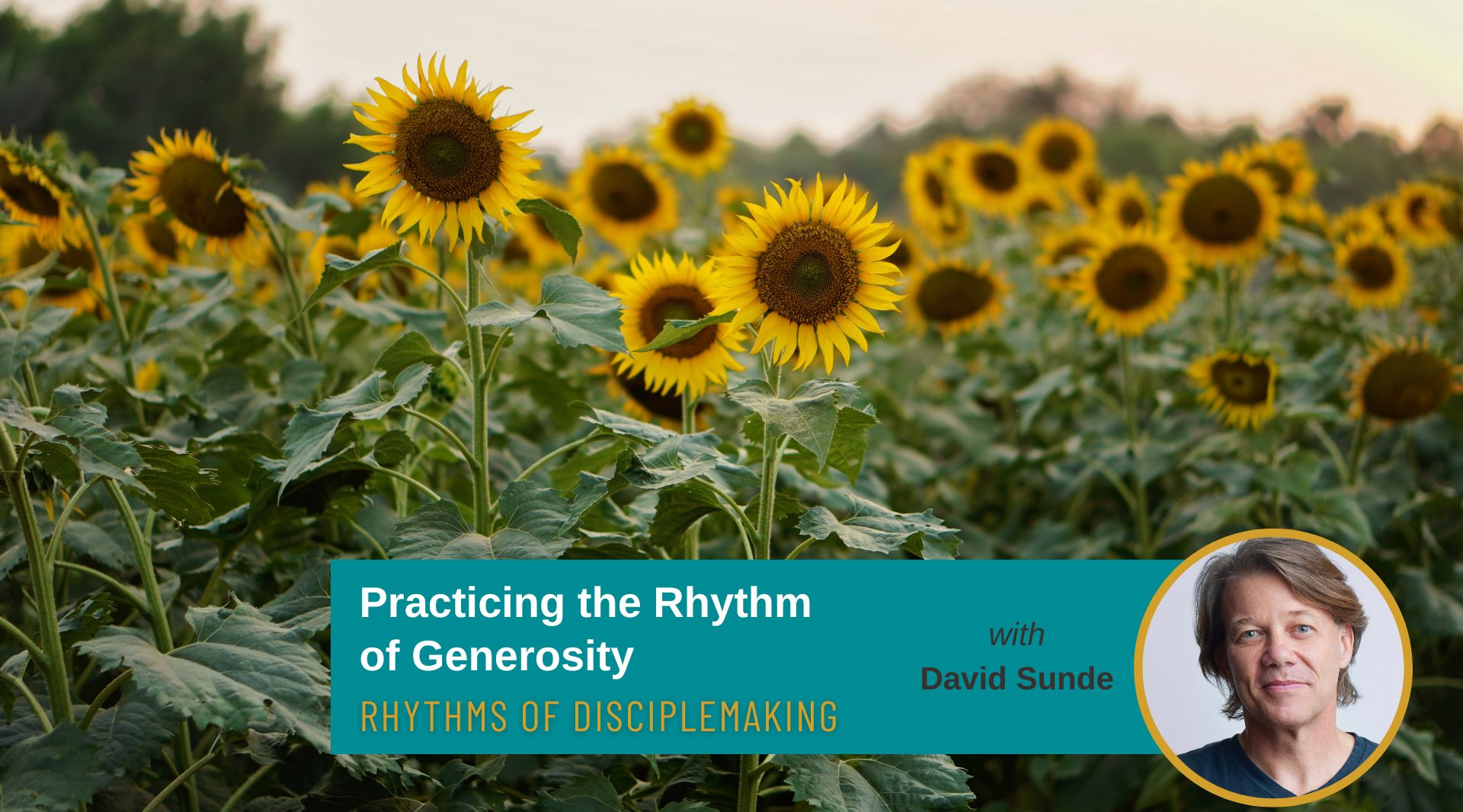This is the last post in the Rhythms of Disciplemaking three-part series. In his book, Small-Batch Disciplemaking: A Rhythm for Training the Few to Reach the Many, David Sunde offers seven disciplemaking rhythms (or as David explains, one rhythm that is expressed in seven ways). This series includes three of the seven rhythms. In the second post, David gave us a divine picture of rest. You can read it here. In this next post, David refreshes the idea of generosity by comparing a steward to a trustee. Thank you for joining us for this disciplemaking series!
Have you ever thought about the difference between a steward and a trustee? In general, when we talk about finances in the church, we use the language of stewardship. However, stewardship can be a limited metaphor to talk about leveraging resources. One of its definitions implies “I’m a good manager of what’s mine.” A trustee, on the other hand, is always someone charged with caring for someone else’s estate. If we extend the metaphor to our spiritual lives, a steward might approach giving from a perspective of “what’s mine,” while a trustee would see themselves as managing God’s estate. Obviously, both are good. Neither would be considered “the right way.” But perhaps framing our giving from a trustee perspective might help us hold our possessions and resources more loosely in light of God’s grace. So as we grow as disciples on mission, the critical question isn’t How much should I give back to God? He already owns the estate. Rather, we need to ask, How much should I keep for myself if it’s all God’s? (Read this blog post by Leonard Sweet to dig deeper.) In a sense, we’re all spiritually trust fund babies! We’ve all been entrusted with some level of health, wealth, influence, experience, education, intellect, and giftedness that is God’s gracious extension of Himself.
The rhythm of generosity offers a renewed way to understand our role as spiritual trustees. As we learn to see God as the Source of our lives, we see that all life is a gift. So everything we’ve been given (or even worked for) . . . it’s all a gift. Realizing that all we have is a gift—a sacred trust—we can learn to hold all these things with open hands. Paul also wrote this to Ephesus’s young, multicultural church:
God saved you by his grace when you believed. And you can’t take credit for this; it is a gift from God. Salvation is not a reward for the good things we have done, so none of us can boast about it. For we are God’s masterpiece. He has created us anew in Christ Jesus, so we can do the good things he planned for us long ago. Ephesians 2:8-10, NLT
Ephesus was renowned for the temple of the goddess Artemis. Her temple was one of the Seven Wonders of the Ancient World, and the city was full of artisans and tradesmen whose income came from artwork depicting Artemis. In Ephesians, Paul surprises his Ephesian audience with his description of grace. Rather than people making art out of God, Paul describes a God who makes art out of people! Grace is about a God who comes to us, not about us striving toward Him. We’re saved by grace for good works. And growing in faith should produce something in us. Most notably, love and good works! God seeks to shape each of us into a masterpiece—to create beauty out of our circumstances as we draw near, love outwardly, and trust that He sees the whole canvas. In short, God is irrationally generous when it comes to creation and our humanity. His heart is unmistakably gracious, which for us—as God’s image bearers— informs our Christian calling and identity.
Would you like to become increasingly generous? Click here for a guided prayer about developing a posture of generosity.
You’re likely familiar with the concept of karma, the popular idea that if you log enough good, kind, or selfless acts, it will tip some cosmic scale in your favor, but if you’re a jerk, it’s poetic justice when something bad happens to you. The belief that some force in the universe acts as the great equalizer is compelling to some people, but it’s not how God operates. Grace doesn’t start or end with the good outweighing the bad. When we consider the enormity of God’s grace, we might feel bad about our own paltry efforts. But we shouldn’t! God created us in His image to “do the good things he planned for us long ago,” as Paul told the Ephesians. God offers us His grace and wants us to be His ambassadors (2 Corinthians 5:20).
I wouldn’t be the first person to suggest that money is a better servant than master. Maybe it’s helpful, then, to think of generosity as a tuning fork. When handled humbly as an instrument of God, it creates a kind of “harmonic” with the image of God within each of us. As we align our lives in Christ with needs and opportunities around us, our lives become increasingly “in tune” with God.
I find it interesting that the Hebrew word for righteousness (tzedakah) also translates as charity. When we offer our gifts to meet needs, we need to keep in mind that “His righteousness endures forever” (2 Corinthians 9:9, NASB).

David Sunde
has been involved in professional non-profit and spiritual and developmental leadership for over twenty years. He’s a native of San Francisco, California, with a bachelor’s in public administration from San Diego State University and a master’s in pastoral studies from Azusa Pacific University. He is currently working on his doctorate in semiotics, culture, and the church through George Fox University. David and his wife, Laurel, have two kids, Bjorn and Annika, and live in Austin, TX. You can engage with him further at www.davidsunde.com.

